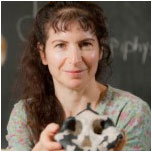 Hesham M. Sallam, Mansoura University Vertebrate Paleontology Center, Department of Geology, Mansoura University, Mansoura, 35516, Egypt, and Department of Evolutionary Anthropology, Duke University, Durham, NC 27708, USA sallam@mans.edu.eg
Hesham M. Sallam, Mansoura University Vertebrate Paleontology Center, Department of Geology, Mansoura University, Mansoura, 35516, Egypt, and Department of Evolutionary Anthropology, Duke University, Durham, NC 27708, USA sallam@mans.edu.eg
Hesham Sallam undertook his masters on the stratigraphy, paleontology, and paleoecology of the Cretaceous deposits in the Sinai Peninsula, Egypt. He then completed his PhD in 2010 at the University of Oxford (UK), where his dissertation focused on mammals recovered from the famous Fayum fossil deposits in Egypt. During his PhD, he was an affiliated scientist at Stony Brook University, Ohio University in 2015 and currently at the Department of Evolutionary Anthropology, Duke University. He returned to Egypt in 2010 to take up a position at Mansoura University, teaching vertebrate paleontology, where he now serves as a lecturer. His current research projects are broadly in the area of vertebrate paleontological research in Afro-Arabia, and more specifically are aimed at understanding mammalian evolution in Africa, with a particular emphasis on the Afro-Arabian radiations of hystricognathous and anomaluroid rodents. Moreover, he founded the Mansoura University Vertebrate Paleontology (MUVP) initiative, a combined research, outreach, and conservation endeavor based in the Geology Department of that university. The goals of MUVP include educating Egyptian vertebrate paleontologists, expanding awareness of Egypt's vertebrate paleontological resources, and undertaking preparation, anatomical study, and curation of Egypt's fossil vertebrate paleontological resources. Hesham has been involved in vertebrate paleontological fieldwork in the Late Cretaceous and Paleogene of Egypt, Kenya, Yemen and USA, and geological and invertebrate paleontological work in the Late Cretaceous beds of the Sinai Peninsula in Egypt.

 Afifi H. Sileem, Vertebrate Paleontology Section, Cairo Geological Museum, Cairo, Egypt, afifi.sileem@yahoo.com
Afifi H. Sileem, Vertebrate Paleontology Section, Cairo Geological Museum, Cairo, Egypt, afifi.sileem@yahoo.com
Afifi received his masters from Al-Azhar University, Egypt in 2010 and completed his PhD in 2016 at the same university. He is currently the Head of the Paleontology Department at the Egyptian Geological Museum, Egypt. Afifi's current research focuses on the evolution and relationships of Paleogene anthracotheriids from the Fayum Depression, Egypt. Afifi has led and been involved in numerous vertebrate paleontological expeditions with Duke University in the Fayum Depression; Michigan University in Wadi Hitan and Pennsylvania University in the Bahariya Oasis of Egypt. He also conducted field work on the Upper Cretaceous deposits.

 Ellen R. Miller, Department of Anthropology, Wake Forest University, Winston-Salem, NC 27106, USA, millerer@wfu.edu
Ellen R. Miller, Department of Anthropology, Wake Forest University, Winston-Salem, NC 27106, USA, millerer@wfu.edu
Ellen R. Miller is a Biological Anthropologist specializing in African Paleoanthropology. Ellen received her PhD from Washington University (Saint Louis) in 1996. She is currently Professor of Anthropology at Wake Forest University in Winston-Salem, North Carolina. Ellen's major research focus revolves around the origin and subsequent radiation of Old World Monkeys (Cercopithecoidea) as documented in the fossil record. She also is engaged in study of the transition of archaic to modern African faunas as well exploring the primate context from within which humans arose. She is an active field paleontologists who has led many expeditions to Africa, in particular to Egypt and Kenya. Ellen conducted her PhD field research at the early Miocene site of Wadi Moghra in Egypt where she studied the mammalian fauna associated with the early cercopithecoid Prohylobates tandyi. Currently Ellen is leading the excavation and study of the early Miocene faunal assemblage at Buluk in the Turkana Basin in northern Kenya.

 Gregg F. Gunnell, Division of Fossil Primates, Duke Lemur Center, Durham, NC 27705, USA, gregg.gunnell@duke.edu
Gregg F. Gunnell, Division of Fossil Primates, Duke Lemur Center, Durham, NC 27705, USA, gregg.gunnell@duke.edu
Gregg F. Gunnell is a Paleomammalogist and Biological Anthropologist specializing in North American, African, and Asian Cenozoic mammal evolution. Gregg received his PhD from the University of Michigan in 1986. He is currently Director of the Division of Fossil Primates at the Duke Lemur Center in Durham, North Carolina. He is also a Research Associate in the Division of Vertebrate Zoology at the American Museum of Natural History (New York City) and a Resource Associate Professor of Anthropology at the City University of New York (CUNY). Gregg's research focuses on the origination, diversification and biogeography of modern groups of mammals. His fieldwork and research activities have taken him to Asia (Pakistan, Kazakhstan, Indonesia, Myanmar, & India), Africa (Tanzania, Egypt, & Kenya), Europe (Belgium, United Kingdom, Germany, Czech Republic, & France), Australia and North America (USA & Mexico). He has studied the fossil record of many mammalian groups including primates, insectivorans, carnivores, and artiodactyls, as well as several wholly extinct groups. Much of his current research focuses on the origin of modern bats and their diversification across the globe. He serves as series editor for Cambridge University Press, Studies in Morphology and Molecules, has edited three books and has published over 100 scholarly papers on his research results.


